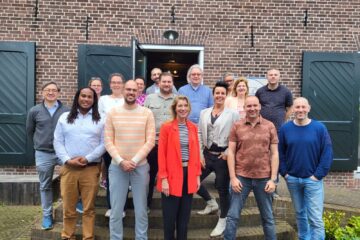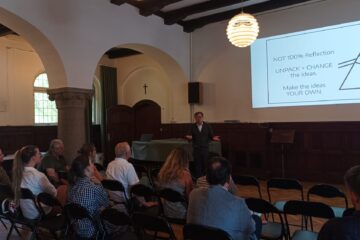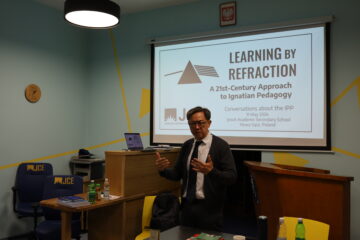At the end of January, the Gokongwei Brothers School of Education and Learning Design (GBSEALD) welcomed a delegation of 11 administrators and staff from the Xavier Learning Community (XLC) of Chiang Rai, Thailand. Led by their School Director, Fr Vinai Boonlue SJ, our Thai colleagues were here for a 5-day Workshop on Jesuit Education and Learning by Refraction from 30 January to 2 February 2023.

The workshop, which was organized by the Ignatian Initiative for Teacher Excellence (IGNITE), and led by its Program Coordinator, Ms Jeraldine Ching, was designed to give the attendees an introduction to Jesuit education, from its roots in Ignatian spirituality to its application through the Learning by Refraction approach to Ignatian Pedagogical Paradigm (IPP).
On the first day, Fr Francis Alvarez SJ, Chair of GBSEALD’s Department of Catholic Education Philosophy and Practice, led an introductory session on Saint Ignatius and Ignatian Spirituality. Building on what the participants already knew about the topic, Fr Francis offered additional details that provoked them to see the origin of Ignatian pedagogy in Ignatian spirituality. One of the participants had this to say:
Despite working with the Jesuits for several years, I had limited knowledge of what Ignatian spirituality is all about before I attended this workshop. Indeed, the workshop enhanced my deeper understanding and inspired me to continue working with the courage to improve my community.

The next day focused on student context, and Ms Ching emphasized the importance of knowing the students. “Just as God meets the retreatants where they are at,” she said, “it is important for the teacher to understand the context of the students.” Some questions that the group agreed were important for teachers to ask themselves included: “What prior knowledge do the students have of the subject? What interests the students outside the class? What current situation are the students in at the moment?”
Context has been key in the running of the XLC. The profile of their students is unique as XLC has been established to educate some of the least-served ethnic minorities of Thailand. For this reason, the talk on student context resonated deeply with the participants.
To see the concrete application of the IPP, the group visited Xavier School in San Juan on the afternoon of the second day. Xavier School was established in the 1950s by Jesuit missionaries expelled from China and is one of the pioneers of the Learning by Refraction approach to Ignatian Pedagogy.
The XLC participants were warmly welcomed by the Xavier School President, Fr Ari Dy SJ, accompanied by the High School Principal, Ms Theresa Ladrido, and her team of academic and formation administrators. The tour around the school campus gave them concrete ideas on how structures and spaces can be designed to create a more Ignatian school atmosphere. The tour was followed by a sharing on how Xavier School has implemented the IPP not only in the classroom but also in their formation activities.
As a result, the participants got valuable concrete ideas on how to practice and apply the different components of the IPP when they go back to their school.

The third day was facilitated by Ms Rita Atienza, Director of GBSEALD’s Ateneo Teacher Center. Because understanding the content and applying learning in real-life situations is vital in 21st-century learning, the whole day was spent in deep conversation on how Reflection and Action must look in the lessons that the teachers create. As one of our Thai colleagues said: “It’s very important to train students to be able to reflect and build up a habit of reflection. Secondly, reflection has to flow in action fruitfully.”

Ms Atienza ended the day with the following questions, “What are some key insights that you want your students to take away from the course you are teaching? Will your reflection questions and assessments lead them to arrive at these insights?”
The fourth day focused on the IPP element of Experience and was spent experimenting with various learning spaces and experiences. The sessions given by Mr Galvin Ngo, Director of GBSEALD’s Institute for the Science and Art of Learning and Teaching (SALT), were creative and interactive. The participants harvested new ideas on how they could engage the students back home. One of them quipped, “The learning experience is an important part that impels the learners to consider and reflect the meaning of what they have learned and they can also integrate it into their lives.”

The final day was led by the XLC School Director, Fr Vinai, who encouraged the participants by reminding them of the importance of their task as teachers and their capacity to make a difference in so many students’ lives, “Though these students come to us for different reasons, we do what we can to build their confidence. Helping them to communicate well in English will not only build their confidence but will also allow them to pursue further education in the future.”
One of the participants, Sikarin Kosanwattanam summed up their experience and learnings well when he wrote:
Ignatian Pedagogy’s goal is to let the learners grow to become men or women for others, working and living in the world society. Throughout the sessions, Reflection + Action + Experience were clarified with in-depth explanations, activities, comments, and teaching experiences were shared… [We realized that] teachers are in charge of nurturing students to serve other people with generosity to glorify God in a greater way. Ignatian Pedagogy is the art and science of teaching. which is not limited to only Christianity, but all of humanity.

Numerous Ignatian educators around the world have been trained in the Learning by Refraction approach to Ignatian Pedagogy. The book of the same title has been translated into Spanish, French, Chinese, and Thai. Other translations are in the works.


